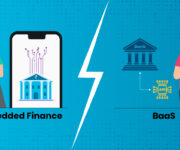Banking-as-a-Service (BaaS) has emerged as an innovative factor in the realm of finance. It makes it possible for non-banking enterprises, such as fintech startups, e-commerce platforms, etc., to offer banking services to their customers without establishing a conventional bank.
According to projections, the BaaS business model will generate around USD 30 billion in revenue in 2023, expanding at a CAGR of almost 16% and estimated to rise at a 16.2% CAGR between 2023 and 2033.
Although Banking-as-a-Service has many benefits, choosing the best BaaS partner requires navigating a challenging and risky environment. This blog will examine the world of BaaS and explain the risks and complexities in selecting the best partner.
Understanding Banking-as-a-Service (BaaS)
Banking-as-a-Service (BaaS) is a model that enables businesses to leverage the capabilities and infrastructure of a licensed banking institution to provide financial services to their customers.
Due to its ability to improve customer satisfaction, optimise financial operations, and stimulate revenue growth, this novel technique has become extremely popular.
BaaS essentially enables businesses to focus on their core skills while leaving the infrastructural, regulatory, and compliance responsibilities to a banking partner.
The Benefits of Banking-as-a-Service (BaaS)
Before delving into the risks and complexities, let’s first explore the compelling advantages BaaS offers:
1. Speed to Market
The quick rollout of financial services is one of the most important benefits of BaaS. Businesses can launch quickly without the time-consuming and expensive process of obtaining a banking licence.
2. Cost-Effectiveness
BaaS reduces the overhead costs of creating and maintaining a banking infrastructure. Businesses can allocate resources more wisely because of this cost-effectiveness.
3. Enhanced Customer Experience
Businesses with access to banking services can give their customers a seamless and comprehensive experience, fostering loyalty and trust.
4. Scalability
BaaS vendors frequently provide expandable solutions, allowing businesses to modify and expand their financial services as necessary without making significant investments in technology and compliance.
The Risks and Complexities of Banking-as-a-Service (BaaS)
Despite the benefits of BaaS, it’s critical to be aware of the potential risks and complexities associated with choosing the right BaaS partner:
1. Regulatory Compliance
Banking-as-a-Service (BaaS) is governed by a complex web of regulations that vary by country and location. A company’s image could be damaged if these guidelines are not followed.
Therefore, ensure the BaaS partner can adapt to changing regulatory environments and has a proven track record of navigating regulatory environments.
Therefore, choosing a BaaS partner with an in-depth understanding of compliance is crucial. Despite the constantly shifting legal landscape, they must have the know-how to guarantee that your activities fully comply with all applicable regulations.
A suitable BaaS partner must possess the necessary knowledge to ensure compliance with all applicable laws. This entails being updated on changes in the regulatory environment and swiftly adapting to be compliant. Without this knowledge, the partnership may quickly get entangled in legal issues.
2. Data Security
Handling sensitive financial data calls for the highest level of security. The loss of trust among customers may be catastrophic if a data breach occurs.
Data breaches are now the largest risk for lenders, costing an average of USD 5.85 million per incident. Data security must be prioritised since it directly impacts the reliability of the BaaS offering and the confidence of customers.
To reduce this risk, the BaaS partner must have robust safety measures in place to secure sensitive data, assuring the highest level of data protection.
These include access restrictions, intrusion detection systems, encryption, and periodic security audits. A thorough incident response strategy should also be in place at the partner’s enterprise to lessen the effects of any security breaches.
3. Limited Customisation
BaaS may have customisation restrictions while having several benefits, such as quick time to market and cost-effectiveness. In order to gain a competitive advantage, businesses may find it difficult to customise financial services to their target market.
When comparing BaaS providers, pay close attention to the level of customisation they give and how well it fits your business’s particular needs. For long-term success in the fiercely competitive financial services industry, businesses must strike the proper balance between utilizing the benefits of BaaS and maintaining the ability to cater to the unique demands of their customers.
4. Reliability
When crucial financial functions are outsourced, the business’s dependability and that of your BaaS partner are entwined. Any delays or disturbances on their end might impact your business, resulting in halted services and dissatisfied clients.
Assess the stability and uptime history of the BaaS provider carefully to ensure they meet your reliability standards. Understand their business continuity and disaster recovery processes to ensure they meet your dependability standards. In the quick-paced world of financial services, having a reliable partner is crucial for maintaining operational efficiency and fulfilling consumer expectations.
5. Exit Strategy
It’s crucial to prepare for unforeseen circumstances and have a backup plan in place if switching to BaaS providers is needed. When the business needs to be well-prepared, this procedure can be time-consuming and challenging.
The transfer of services to a new provider, contract termination, and data migration are all included in a well-thought-out exit strategy. Planning ahead provides a smoother transition and reduces possible problems during the change, protecting your reputation and company continuity in the process.
Conclusion
In conclusion, Banking-as-a-Service (BaaS) offers an exciting avenue for businesses to enter the financial services arena, promising rapid growth and enhanced customer experiences. Finding the ideal BaaS partner, meanwhile, has its complexities and risks.
Among the crucial factors that need careful consideration are regulatory compliance, data security, restricted customisation, dependability, and the significance of a clear exit strategy.
Choosing a partner that understands compliance, adheres to rigorous safety protocols, and is committed to satisfying your business needs is increasingly important as the BaaS industry expands. Businesses By deftly negotiating these issues, they may maximise the benefits of BaaS while preserving their brand and consumer confidence.
Finezza is the ultimate micro loan management software streamlining the entire process. Automate loan applications, credit assessments, and approvals, bidding farewell to manual efforts. Monitor and track loans effortlessly with its robust portfolio management features, ensuring timely repayments.
Revolutionise your microfinance operations and unleash the power of advanced technology!
Sign up for Finezza now.




Leave a Reply